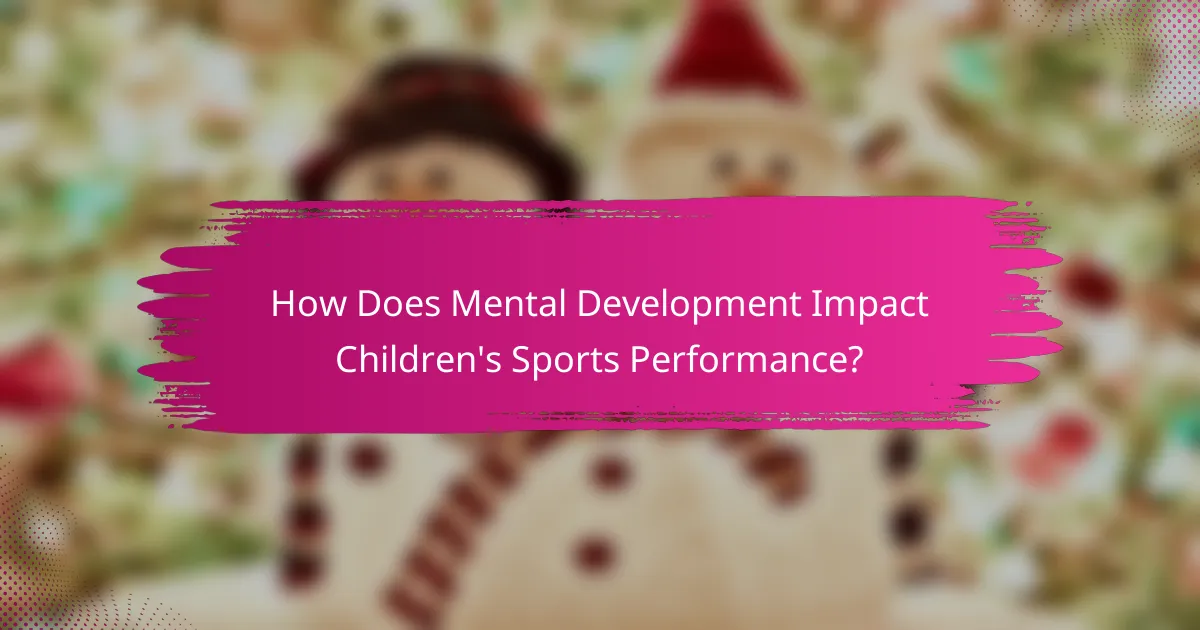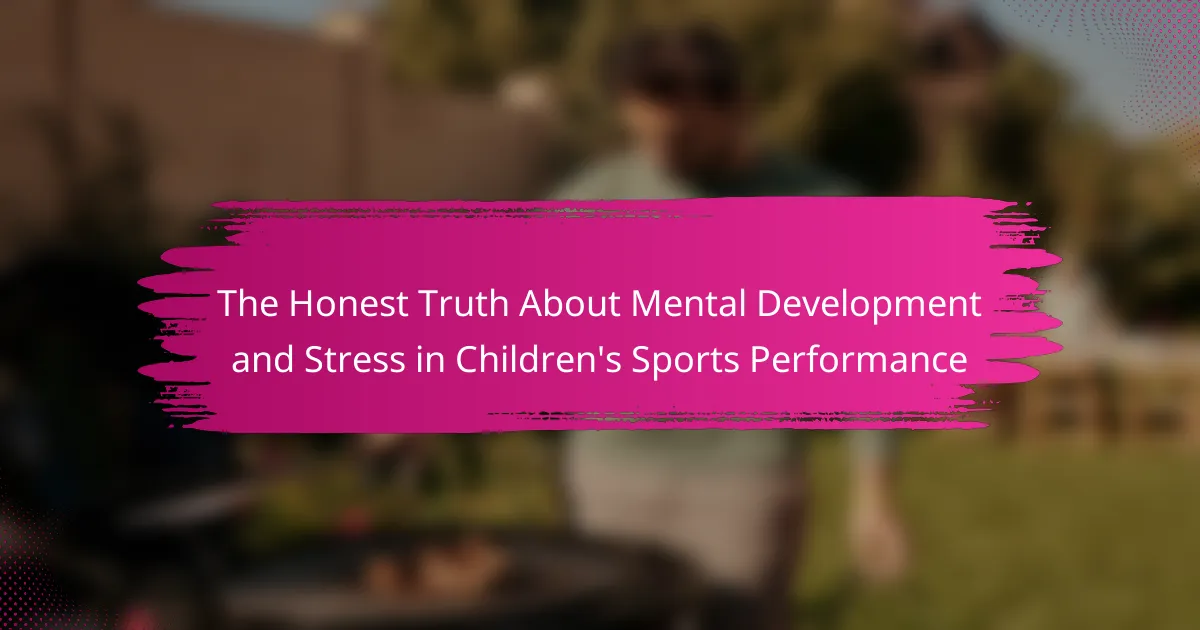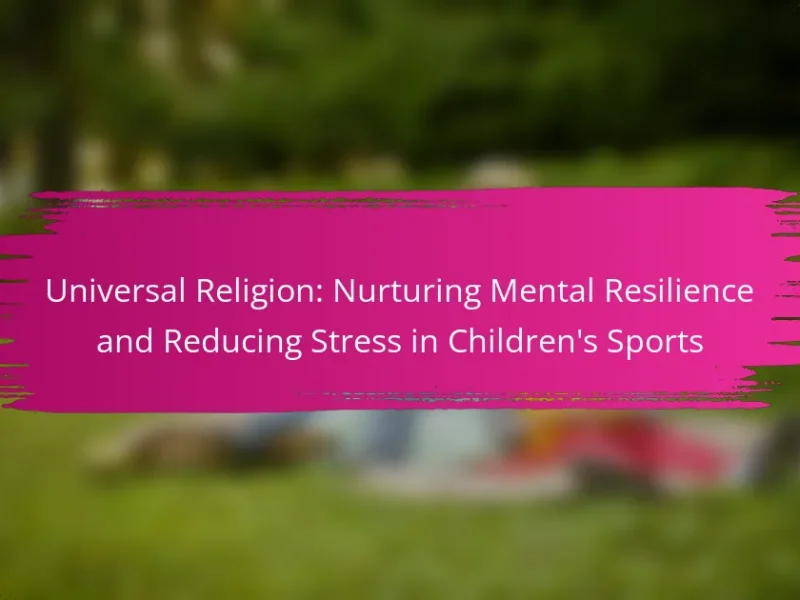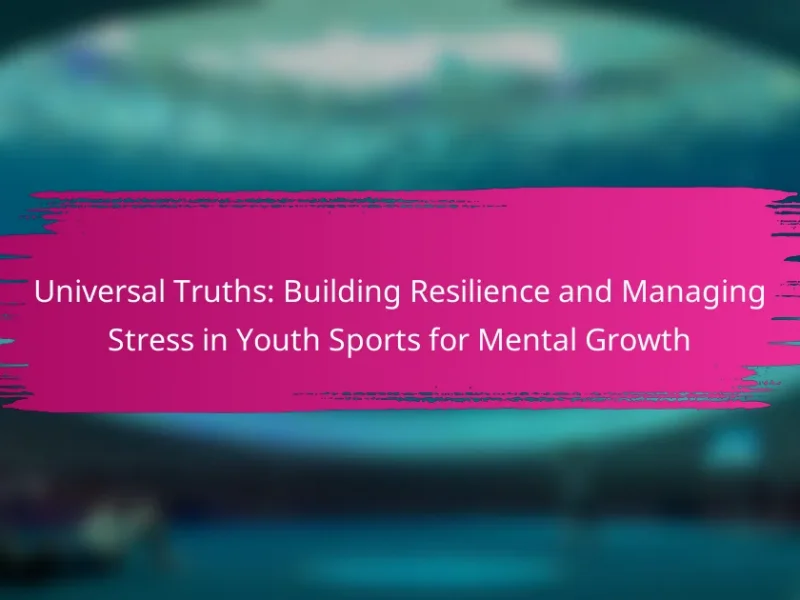Understanding mental development is essential for enhancing children’s sports performance. This article explores how mental skills improve focus and resilience, the benefits of sports on emotional growth, the unique stressors young athletes face, and strategies to foster a supportive environment. Emphasizing emotional resilience and cognitive flexibility can lead to better performance and overall well-being in young athletes.

How Does Mental Development Impact Children’s Sports Performance?
Mental development significantly influences children’s sports performance by enhancing focus, resilience, and decision-making skills. Children with strong mental development can better manage stress and anxiety, leading to improved performance during competition. Research indicates that mental training techniques, such as visualization and mindfulness, can boost athletes’ confidence and concentration levels. For instance, studies show that children who practice mental rehearsal demonstrate higher success rates in sports. In summary, fostering mental development is crucial for optimizing children’s athletic abilities and overall enjoyment in sports.
What Are the Key Stages of Mental Development in Children?
Children’s mental development occurs in key stages influenced by various factors, including stress in sports. The primary stages include sensorimotor, preoperational, concrete operational, and formal operational stages. Each stage plays a crucial role in cognitive, emotional, and social growth, impacting sports performance.
During the sensorimotor stage (birth to 2 years), children learn through sensory experiences and motor actions. In the preoperational stage (2 to 7 years), they develop language and imagination but struggle with logic. The concrete operational stage (7 to 11 years) introduces logical thinking about concrete events. Finally, in the formal operational stage (11 years and up), abstract reasoning and problem-solving abilities emerge.
Recognizing these stages helps coaches and parents support children’s mental development, mitigating stressors that could hinder performance. Understanding the interplay between mental development and stress can enhance children’s sports experiences and overall well-being.
How Does Stress Affect Performance in Young Athletes?
Stress negatively impacts performance in young athletes by hindering focus and increasing anxiety. High stress levels can lead to decreased motivation and poor decision-making during competitions. Research indicates that stress can disrupt the development of essential cognitive skills, which are crucial for athletic success. For example, young athletes under significant stress may struggle with task completion and exhibit reduced physical coordination. Managing stress through supportive environments and mental training can enhance performance and overall well-being in sports.
What Types of Stress Are Common in Youth Sports?
Common types of stress in youth sports include performance anxiety, peer pressure, and overtraining. Performance anxiety arises from the fear of not meeting expectations. Peer pressure can lead to unhealthy competition among teammates. Overtraining occurs when young athletes push themselves too hard, risking physical and mental burnout. Each type of stress can significantly impact a child’s mental development and sports performance.
What Are the Signs of Stress in Young Athletes?
Young athletes exhibit various signs of stress, including changes in behavior, emotional fluctuations, and physical symptoms. Common indicators are increased anxiety, irritability, withdrawal from activities, and sleep disturbances. Physical manifestations may include headaches, stomachaches, or fatigue. Recognizing these signs early is crucial for supporting mental health and optimizing performance.

What Are the Universal Benefits of Sports on Mental Development?
Engaging in sports offers universal benefits that significantly enhance mental development in children. These benefits include improved self-esteem, better emotional regulation, enhanced social skills, and increased focus. Participation in sports fosters resilience, teaching children to cope with stress and setbacks effectively. Research indicates that physical activity stimulates brain function, promoting cognitive development and academic performance. Additionally, team sports encourage collaboration and communication, essential skills for personal growth.
How Do Team Sports Foster Social Skills and Emotional Growth?
Team sports significantly enhance social skills and emotional growth in children. They promote teamwork, communication, and resilience. Children learn to navigate conflicts and build relationships, fostering empathy and cooperation. Participation in these sports also helps manage stress and anxiety, contributing to overall mental well-being. Engaging in team dynamics cultivates a sense of belonging, which is crucial for emotional development.
What Cognitive Skills Are Enhanced Through Sports Participation?
Sports participation enhances cognitive skills such as focus, decision-making, and teamwork. Engaging in sports requires children to concentrate on tasks, improving their attention spans. As a result, they develop better decision-making abilities through real-time problem-solving during games. Team sports foster collaboration, teaching children to communicate effectively and work towards common goals. These skills contribute to overall mental development, reducing stress and anxiety in competitive environments.

What Unique Challenges Do Young Athletes Face Regarding Mental Stress?
Young athletes face unique challenges regarding mental stress, including pressure to perform, balancing academics and sports, and social expectations. These factors can lead to anxiety and burnout.
The pressure to excel often stems from coaches, parents, and peers. This expectation can create immense stress, impacting mental well-being. A study found that 70% of young athletes experience significant performance anxiety.
Balancing academics and sports adds another layer of stress. Young athletes must manage time effectively, often sacrificing personal time and rest. This can lead to fatigue and decreased performance in both areas.
Social expectations further complicate their mental landscape. Young athletes may feel the need to conform to team norms or seek approval from peers. This can result in feelings of isolation or inadequacy if they do not meet these expectations.
Addressing these challenges is crucial for fostering healthy mental development and enhancing overall sports performance.
How Do Parental Expectations Influence Stress Levels in Children?
Parental expectations significantly influence children’s stress levels in sports. High expectations can lead to anxiety, reducing performance and enjoyment. Studies show that children facing intense pressure may experience burnout, impacting their overall mental development. Encouraging a healthy balance between support and realistic goals fosters resilience and reduces stress.
What Role Does Coaching Style Play in Mental Development?
Coaching style significantly influences mental development in children’s sports performance. A supportive coaching approach fosters resilience and confidence, while a critical style may induce stress and anxiety. Research indicates that positive reinforcement enhances motivation, leading to improved performance. Coaches who prioritize mental well-being create a nurturing environment, promoting better focus and enjoyment in sports. This holistic development is crucial for long-term athletic engagement and personal growth.

What Rare Attributes Affect Mental Development in Children’s Sports?
Rare attributes affecting mental development in children’s sports include emotional resilience, social adaptability, and cognitive flexibility. These attributes can significantly enhance performance by fostering a positive mindset and effective coping strategies. Emotional resilience helps children manage stress, while social adaptability encourages teamwork and communication. Cognitive flexibility allows for quick adjustments during competition, promoting better decision-making. Understanding these rare attributes can lead to improved training methods that support holistic development in young athletes.
How Can Individual Differences in Personality Impact Performance?
Individual differences in personality significantly influence children’s sports performance. Traits such as competitiveness, resilience, and anxiety levels can affect motivation and focus. For example, children with high self-confidence often excel under pressure, while those with high anxiety may struggle. Understanding these personality attributes helps coaches tailor their approaches, enhancing performance and mental development.
What Are the Long-Term Psychological Effects of Competitive Sports?
Competitive sports can lead to long-term psychological effects, including enhanced resilience and anxiety management. Participation fosters self-discipline, teamwork, and leadership skills. However, it may also contribute to stress and burnout if expectations are excessive. Research indicates that children involved in competitive sports often develop coping strategies that benefit their mental health in adulthood. Balancing competition with a supportive environment is crucial for positive outcomes.

What Strategies Can Help Mitigate Stress in Young Athletes?
To mitigate stress in young athletes, focus on fostering a supportive environment, promoting open communication, and teaching stress management techniques. These strategies can enhance mental resilience and improve sports performance.
Encourage young athletes to express their feelings about competition. Open dialogues help them process emotions and reduce anxiety.
Implement regular mindfulness practices such as breathing exercises or visualization techniques. These methods can significantly lower stress levels and improve focus during competitions.
Promote a balanced approach to sports by emphasizing enjoyment and personal growth over winning. This perspective can reduce pressure and enhance overall well-being.
Involve parents and coaches in creating a positive atmosphere. Their support plays a crucial role in helping young athletes navigate stress effectively.
How Can Mindfulness Techniques Improve Focus and Reduce Anxiety?
Mindfulness techniques can significantly enhance focus and alleviate anxiety in children participating in sports. These practices foster a present-moment awareness that helps young athletes concentrate on their performance while managing stress. Research indicates that children who engage in mindfulness report improved attention spans and reduced anxiety levels, contributing to better overall sports performance. Techniques such as deep breathing, visualization, and body scans can be easily integrated into training routines. As a result, athletes develop resilience and a more positive mindset, which are crucial for success in competitive environments.
What Role Does Positive Reinforcement Play in Reducing Stress?
Positive reinforcement significantly reduces stress by enhancing children’s confidence in sports. It encourages effort and persistence, leading to improved performance. When children receive praise or rewards for their achievements, they associate their efforts with positive outcomes, which lowers anxiety levels. Studies show that consistent positive feedback fosters a growth mindset, crucial for mental development in competitive environments. This approach not only boosts motivation but also creates a supportive atmosphere, making sports more enjoyable and less stressful for young athletes.
What Are Common Mistakes Parents Make That Increase Stress?
Parents often increase stress in children’s sports performance by imposing unrealistic expectations. This pressure can lead to anxiety and diminish enjoyment in the sport. Common mistakes include overemphasizing competition, neglecting emotional support, and failing to recognize individual development rates. As a result, children may struggle with self-esteem and motivation. Encouraging a balanced approach fosters resilience and a healthier relationship with sports.
How Can Coaches Support Mental Resilience in Young Athletes?
Coaches can significantly enhance mental resilience in young athletes by fostering a supportive environment and teaching coping strategies. They should prioritize open communication, allowing athletes to express their feelings and concerns.
Additionally, coaches can implement mental skills training, focusing on visualization, goal-setting, and positive self-talk. Research indicates that athletes who practice these techniques show improved performance under stress.
Encouraging a growth mindset is essential; this helps athletes view challenges as opportunities for development rather than threats. Coaches should celebrate effort and progress, reinforcing the idea that resilience is built through perseverance.
Lastly, regular feedback and constructive criticism can help young athletes learn from setbacks, making them more adaptable and mentally strong in competitive situations.

What Are the Best Practices for Supporting Mental Development in Youth Sports?
To support mental development in youth sports, create a positive environment, emphasize skill over competition, and encourage open communication. These practices reduce stress and enhance performance.
1. Cultivate a supportive atmosphere that prioritizes emotional well-being.
2. Focus on skill development rather than solely winning.
3. Promote teamwork and collaboration among young athletes.
4. Encourage regular feedback and discussions about feelings and experiences.
5. Set realistic goals that foster growth and resilience.
6. Implement relaxation techniques, such as mindfulness or breathing exercises.
How Can Schools Incorporate Mental Health Education in Sports Programs?
Schools can effectively incorporate mental health education in sports programs by integrating workshops, training for coaches, and creating supportive environments. These initiatives enhance children’s mental resilience and performance.
Workshops on mental health can teach athletes coping strategies for stress and anxiety. Coaches trained in mental health awareness can recognize signs of emotional distress and provide appropriate support. Creating a culture that prioritizes mental well-being fosters open communication, allowing children to express their feelings.
Research indicates that mental health education leads to improved sports performance and overall well-being. A study found that athletes with strong mental health support systems showed a 20% increase in performance metrics. Schools can implement these strategies to promote healthier, more balanced athletic experiences.
What Resources Are Available for Parents and Coaches?
Parents and coaches can access various resources to support mental development and manage stress in children’s sports. Organizations like the American Psychological Association provide guidelines on mental health in youth sports. Workshops and seminars on stress management techniques are available through local sports associations. Online platforms offer courses focusing on emotional resilience and performance psychology tailored for youth athletes. Additionally, books and articles authored by sports psychologists can provide valuable insights into fostering a supportive environment for children in sports.
What Expert Insights Can Guide Healthy Mental Development?
Expert insights emphasize that balancing mental development and stress in children’s sports is crucial for optimal performance. Coaches should foster a supportive environment that promotes resilience and emotional well-being. Research indicates that children who experience manageable stress levels develop better coping strategies, enhancing their focus and motivation. Additionally, incorporating mindfulness practices can improve mental clarity and reduce anxiety during competitions. Engaging parents in positive reinforcement can further support children’s mental growth, ensuring a holistic approach to their sports experience.


